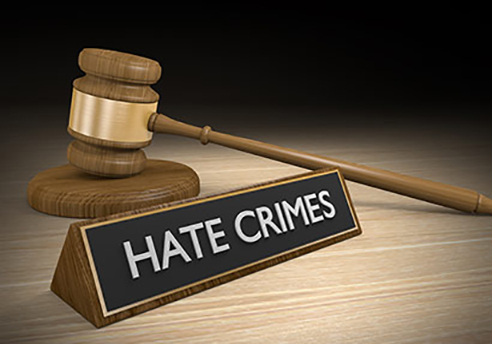
News

SAJBD calls for implementation of hate-crimes law
Published
3 years agoon
By
Nicola MiltzDescribing a “culture of impunity” for hate-crime offenders in South Africa, the South African Jewish Board of Deputies (SAJBD) has called for the passing of the Hate Crimes Bill.
The Board called for official reporting mechanisms for hate crimes in its recent submission on the Prevention and Combating of Hate Crimes and Hate Speech Bill to the Department of Justice and Constitutional Development.
The Portfolio Committee on Justice and Correctional Services invited all stakeholders to once again put forward written submissions on the Bill for consideration.
The long awaited and highly anticipated Bill aims to give effect to the country’s obligations in terms of the Constitution and international human-rights instruments concerning racism, discrimination, xenophobia, and other forms of intolerance such as antisemitism.
It also aims to provide for the offence of hate crimes and hate speech; as well as the prosecution and prevention of these crimes.
The SAJBD said in its submission that in the two decades since the end of apartheid rule, South Africa had made significant progress in ensuring that human rights were respected and afforded to all.
However, in stark contrast to the country’s progressive policy and legislative guarantees for fundamental human rights, incidences of hate crimes, hate speech, and bias-motivated violence had grown in recent years.
“There’s an epidemic of hate in the country,” said Alana Baranov who represents the Board on the steering committee of the Hate Crimes Working Group (HCWG), a multisectoral network of non-government organisations set up to spearhead hate-crimes advocacy.
“Gays, lesbians, and members of the LGBTQ+ community are being murdered. There are gruesome stories just about weekly including stories involving asylum seekers and refugees. There’s impunity of hate, and we urgently need the Bill to be passed,” she said.
According to the Board’s submission, there’s no mechanism for reporting or recording hate crimes in South Africa in a way that distinguishes them from any other crimes.
“As a result, there’s no way to accurately assess the levels of hate crime across the country. In spite of the lack of an official reporting mechanism for hate crimes, civil society has observed clear trends regarding certain types of hate crimes in South Africa.”
It cited the “corrective rape” of black lesbians, race-related attacks, and attacks on foreign nationals such as the xenophobic violence of May 2008 and March 2015, as well as incidents of religious intolerance, which all continue to occur.
“The lack of measures taken to address these acts has created a culture of impunity for hate crime offenders,” the submission said.
Introducing legislation and policy on hate crimes in South Africa would not only help address crimes where the perpetrators are motivated by hatred or bias, but would also improve access to justice for all South African residents, according to the submission.
“Laws on hate crimes will allow the police and justice officials to track trends of crime targeting certain groups, and will ultimately improve the security of all vulnerable communities,” it said.
SAJBD National Director Wendy Kahn, said, “We have been advocating for improvements on hate-crimes legislation for close on a decade. As a country, we are extremely aware of the dangers of unchecked acts of hatred directed against specific groups, be they foreigners, ethnic, or religious groups, or members of the LGBTQ+ community.”
Said Baranov, “After many years of lobbying and meeting with government and civil society stakeholders, and countless workshops and conferences on hate crimes and hate speech, not to mention a few previous submissions on the Bill, I’m excited that the current version has reached this stage in the process. I really do hope that we don’t waste this opportunity to pass this important piece of legislation. Hate is something that affects not just the Jewish and other minority communities, but all who live in South Africa. Hate erodes social cohesion and damages our society. With the sharp rise in hate crimes that we have witnessed recently, the Bill is needed now more than ever.”
She said the Bill would send out a clear message that South Africa rejected prejudice, and that the country was committed to protecting diversity and equality.
Importantly, the Bill would assist the police in understanding what hate crime and hate speech was, and how best to investigate and charge offenders. “It would also give courts sentencing guidelines that recognise the seriousness of these ‘message crimes’ and their impact on the victim and their community.”
Finally, a law would mean that data on hate would be collected by the South African Police Service and the National Prosecuting Authority, which would help us to understand the nature and size of the problem and allow us to make effective and successful interventions, Baranov said.
As far as hate speech is concerned, the Board said the problem appeared to be not that existing anti-hate speech legislation was inadequate, but that there were serious problems in terms of how the law was being implemented.
“It’s proving very difficult in practice to follow through hate-speech complaints, whether through the South African Human Rights Commission or the Equality Courts. The processes laid down for following through complaints may also be too cumbersome, necessitating a review process. Members of the public are also, by and large, unaware of existing remedies and how to access them,” according to the submission.
It submitted that it was important to empower and strengthen the institutions dealing with hate crimes and hate speech in terms of personnel, training, and resources.
The Board also recommended “bolstering current restorative justice programmes in the county and the expansion of tolerance education”, which it added must be regarded as a crucial component of the school syllabus.
“It’s vital that our existing laws against hate speech are effectively implemented and comprehensive legislation on hate crimes is enacted. History has taught that what often ends in genocide and crimes against humanity, like the Holocaust and apartheid, begins with words and isolated hateful actions.”








